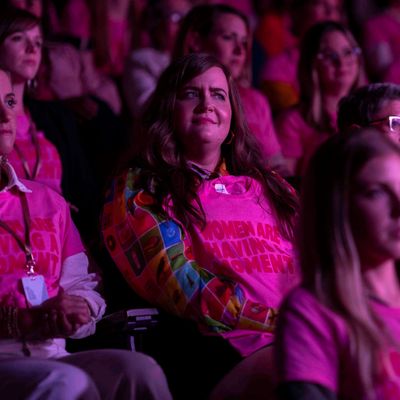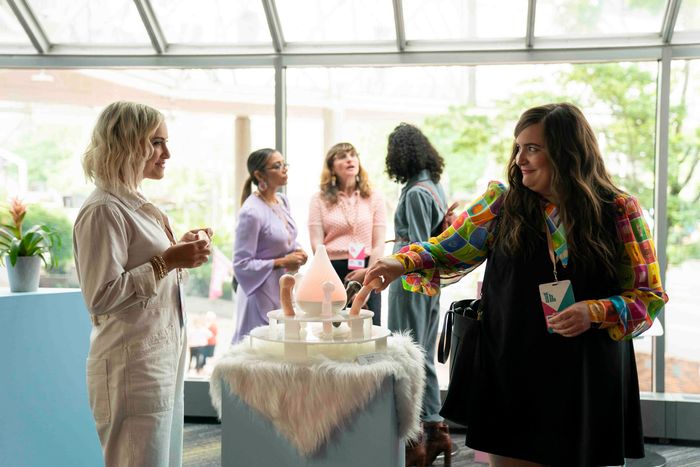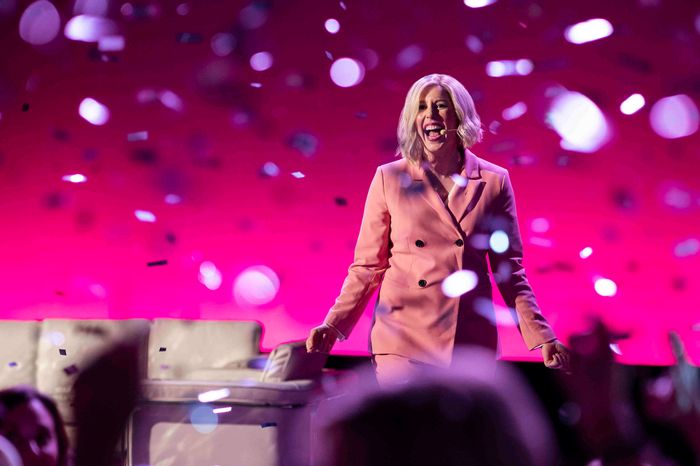
“All day they talked about self-care, but it’s not self-care to agree that you’re ugly and need to be fixed,” Annie (Aidy Bryant) tells her editor in the sixth episode of Shrill’s second season, as she’s sorting out her feelings about a female empowerment conference she covered. “Women are made to feel insecure and each insecurity is an opportunity to make more money.” But that is just one of the problems that Annie has with the very pink conference, hilariously titled “Women Are Having a Moment” or WAHAM, which is led by a former CEO played by Vanessa Bayer.
Written by Saturday Night Live writer Sudi Green and directed by Natasha Lyonne, “WAHAM” smartly explores the complexities of corporate feminism and what that world has in common with patriarchal society. (For starters, the cost of WAHAM attendance is $300, rendering the conference inaccessible to marginalized women.) It is partly inspired by Shrill writer Lindy West’s 2017 article about attending Gwyneth Paltrow’s Goop festival.
In a recent phone call, Vulture spoke with Bryant and Green about their approach to tackling such a complicated topic within a half-hour comedy. “I think for a lot of young women, you feel very conflicted about it and it feels like a very surface-level approach to women’s issues,” Bryant said. “Wear pink! Be loud! Go off, queen! That’s not reality, you know?”
You explored the monetization of feminism and female self-care from a few different angles. What was the inspiration for this episode?
Sudi Green: A lot of Annie’s journey is about empowerment, and I guess we were asking the question: What type of empowerment is that? That word gets thrown around a lot, especially in advertising. We landed on this catchall of the ideas that we were talking about and complaining about in the writers’ room, this idea of the co-opting of the beauty industry and that empowerment narrative.
Aidy Bryant: Lindy wrote a fantastic article about Goop and that, in some ways, was where we started. But Goop is not the only one. Everywhere you turn, this is such a thing. I think for a lot of young women, you feel very conflicted about it and it feels like a very surface-level approach to women’s issues. Wear pink! Be loud! Go off, queen! That’s not reality, you know?
Tell me more about those conflicting feelings.
Bryant: We are this generation that’s been told girls can do anything that boys can do. We feel that’s true. We feel like women are equal, but absolutely the world doesn’t reflect that. Often the solutions that are handed to women are cosmetic rather than anything to actually move the needle. It’s frightening that often the idea of an empowered woman is paired with someone who is beautiful, polished, dressed cool, has perfect skin …
Green: … And is rich!
Bryant: And is rich. That’s a haunting and horrible aspiration.
Green: Because so many feminist narratives are widely accepted, the advertising industry has caught on to say, “Well, we don’t want to say we want to make women thinner. We want to make them well and healthy.” It’s harder to dissect. What am I really absorbing and being told? And that is what WAHAM is about. We have these big pink letters telling you to go off, but there are layers behind it and that’s even more sinister in a way.
Some women at WAHAM say they got a lot from being there, from helping form these new communities. That was valuable to them and Annie resists the urge to write a hit piece because of it.
Bryant: That was the thing that we talked the most about. For us in the entertainment industry, we live in a very L.A.- or New York–centric state of mind. We do think of every lady as woke to this. But our election showed us that that’s not the case, particularly for white women. A lot of people are not plugged into what their best interests are. And that’s horrifying. I’m from Arizona and I was very lucky to have a feminist mother and grandmother, but still, many ideas about women and how they should be allowed to succeed and what true equality is, I didn’t encounter until I moved to a big city like Chicago. So I felt very conscious of people, like my family members or girls I had grown up with, who find those girl-power messages enlightening or helpful. For a lot of people, it is an entry point into Feminism 101. I have trouble pooh-poohing that, but because I feel like I’ve taken Feminism 208 or whatever, it’s a tricky position. It’s about trying to find this balance of being skeptical but optimistic.
Annie’s take is: How can you have a conversation about women’s wellness and empowerment without getting political, without exploring why this conference isn’t accessible to everyone? It’s complicated.
Green: There are so many things to cover; for one conference to solve it all is a high order. But it comes down to money. A lot of what this conference is about is how the messaging and the products and what they’re trying to get you to hold on to is ultimately about the dollar sign.
Tell me about creating the conference itself. It seems like it would be fun coming up with the products and the speech Vanessa Bayer gives.
Bryant: We worked super closely with our costume designer Amanda Needham and our production designer Schuyler Telleen. We said, “We want this to feel like a pink-bubblegum world.” They made that happen. And Sudi is the one who came up with this idea of “Women Are Having a Moment,” which is the perfect hellish tag.
Green: I wrote this episode, but the writers’ room was extremely collaborative. One of the joys of my life was sending out an email saying that we need fake booth names and just getting to do a Google doc with things like “Go Bitch Cycling Studio” or “Modern Slut Lingerie.” Just lists of all these Easter eggs and bathroom signs and things like that.
The leg cream really got me. It was funny, but it also made me think about how these products are often sold to us by seizing on our insecurities. “You, too, can make your disgusting legs pretty!”
Bryant: Totally. We were trying to take the subtext of what a normal ad would say and make it what the person’s actually saying. Like, “This is to make your legs even more gorgeous,” but what you’re really saying is, “Your legs are gross and you’ve got to fix that.” A new thing to worry about!
You’ve worked with Vanessa Bayer before, but why did you choose her as the head of this company?
Bryant: She’s so specifically good at smiling through pain. She has hate in her eyes through a smile, and that was the perfect vibe. I worked with Vanessa in Chicago before we were ever on SNL, so it was best-case scenario to have someone who I totally trust. Watching her do the big talk on the stage, I could watch that forever.
Like when she introduces the person she fired and celebrates it.
Green: Vanessa has such a quality of sweetness that even when she’s saying these extremely biting things, she knows how to give you the person that you want.
The most powerful moment in the episode comes as a surprise: When Annie’s editor asks her what an example of true self-care is for her, she says it was when she had an abortion. How did you land on that scene?
Bryant: After an experience like this, where you feel totally out of body, sometimes you do end up returning to something that feels extremely real.
And what is a cut-and-dry example of when she took care of herself? For Annie, it makes perfect sense in a world of leg makeup and eye creams and fancy dildos to be like, What actually matters here?
Green: That was the scene that we worked on the most. There were versions of it that were really long because we wanted to say everything that she was feeling. Even on set, with Aidy and John Cameron Mitchell [who plays Annie’s editor] and Natasha Lyonne, we were like, “What feels natural?”
Bryant: So much of what people say about John’s character is that he’s a mean boss or a tough boss. And what I find really lovely about that moment is that he’s really listening to her. She’s really expressing herself, and they finally find this point of connection where he sees her as an in-control adult with real thoughts. It’s an example of one of the statements we make on the show, which is that her mind has value. She’s valuable in many ways, but she’s a smart person. Ultimately, worrying about your legs isn’t a good life to chase.






